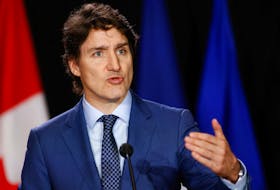During the COVID-19 pandemic, Canadian health officials have admittedly made several major mistakes despite their experience with SARS in 2003. Stockpiles of personal protective equipment were allowed to expire — 80 per cent were destroyed without being replaced, and some were even sent to China last February.
However, we do not know what we do not know. Such reversals in thinking are not unprecedented in science. “Facts” change. Many of these shifts in thinking have occurred surprisingly recently.
In recent months, there have been a number of 180-degree shifts in policy recommendations in dealing with the coronavirus. Initially, it was unclear whether human-to-human transmission occurred. At one point in time, there was no point in restricting air travel from “hot spots” until there was. In January, the virus seemed to be originating and largely confined to China. It then rapidly moved to Europe, possibly mutated, and likely this area was the source of most infections in Eastern North America. The significance of mutations in altering infectivity has been controversial as has the prevalence and risk of asymptomatic persons spreading the virus.
Health Minister Patty Hajdu, Dr. Theresa Tam, and other public health experts were adamant that closing the U.S.-Canada border would be ineffective, that is, until it was closed on March 21. Though it was employed in Taiwan, South Korea and many other countries early during the outbreak, wearing masks in public was initially not recommended in Canada.
Yet now it is recommended in grocery stores and other public places, and is being mandated on public transit systems in Toronto, Ottawa and Montreal, by 80 countries and 18 U.S. states. According to CNN, masks may reduce the rate of spread by a factor of six.
However, we do not know what we do not know. Such reversals in thinking are not unprecedented in science. “Facts” change. Many of these shifts in thinking have occurred surprisingly recently.
I graduated from medical school in 1970. Of course it also seemed like “modern times” and I naively assumed that in future, new antibiotics, anti-cancer drugs, and blood pressure medications would be developed, but it seemed likely that all the major diseases had been identified. How wrong I was.
Several infectious diseases were still unknown. These included Lyme disease, Legionnaire’s disease, Ebola virus, AIDS, SARS and Zika. COVID-19 was first identified early this year. So far it has globally resulted in over 11 million cases and 520,000 deaths.
Also, up until the late 1960s, if you had seen top cardiologists in the world, they would not have known the significance of a click or murmur. Once echocardiograms were developed, mitral valve prolapse became widely recognized — a condition affecting two to three per cent of the population and the commonest genetic cardiovascular abnormality in humans.
Beta-blocking medications were absolutely prohibited in persons with congestive heart failure until early trials in the mid-1970s. By the 1990s, lower doses were found to be beneficial. They are now mainstream therapy.
From these many examples, it is clear that we should give our public health officials considerable slack when making statements. Knowledge of the coronavirus pandemic is rapidly changing.
However, at any point in time, politicians should be consistent and not confuse and undermine the credibility of public health officials by their words and/or actions.
This applies to Prime Minister Justin Trudeau’s visit last Easter to see his family at Harrington Lake and his participation in closely-packed protests — however well-intentioned. It also concerns U.S. President Donald Trump’s refusal to wear a mask, and his organization in “hot spot” areas of large indoor meetings such as in Tulsa, Phoenix and Mount Rushmore. Few persons wore masks or practiced physical distancing.
John M. Barry recounts in his book, “The Great Influenza,” when the second wave of influenza was returning to the United States, politicians in Philadelphia refused to cancel a parade against the strong pleas of local physicians and public health experts. As a result, 12,000 persons died.
We must recall the words of George Santayana: “Those who cannot remember the past are condemned to repeat it.”
Dr. Charles S. Shaver,
Ottawa









